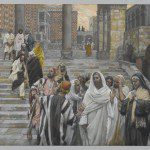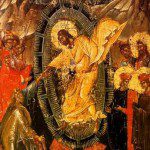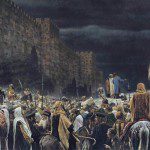
And the Spirit of God came upon him . . .
Biblical stories of encounters with God or with angelic beings are fascinating in their variety. Balaam lifted up his eyes, saw the tribes of Israel encamped, “and the Spirit of God came upon him.” The same Spirit came upon the messengers of Saul and they abandoned their mission to take David and began prophesying. The Spirit actually rushed upon Samson to help him break free. In Acts we read that Peter and John prayed for certain new believers to “receive the Holy Spirit, for he had not yet fallen on any of them.” The Spirit of God comes—appears, shows up suddenly, descends, rushes, falls, confronts, inspires, comforts, blows where it will.
I am interested in how divine encounters happen. When we pray, especially when we enter into a time of listening as in centering prayer or meditation, we open ourselves—our time, our minds, the “ears of our hearts.” Sometimes direction comes by way of a thought, an image, a phrase or sentence, a sudden thread of memory that points toward an avenue of reflection or offers a game-changing insight.
Before that happens, though, what exactly do we do to prepare the way for the Spirit to come? People speak of that time of preparation in various ways, each of which is worth pausing over.
We open ourselves. Opening suggests that something in us tends to close up, perhaps protectively, in the course of the day’s activities. The idea that there is some need to let God in recalls the poignant words: “Behold, I stand at the door, and knock: if any man hear my voice, and open the door, I will come in to him and will sup with him and he with me.” The image suggests that prayer is a kind of hospitality toward a God who waits to be welcomed—and that prayer itself is a feast—nourishing and companionable.
We enter into. Sometimes it is we who are the guests. We enter sacred space, sacred time, an inner sanctum. We leave something behind. We take off our shoes, seeing that the ground we stand upon is holy. George Herbert’s lovely poem that begins “Love bade me welcome” offers one of the sweetest images I know of Christ as the host and the one who seeks him as guest, welcome, unworthy as he is, to “sit and eat.”
But not all ways of imagining divine encounter are quite so benevolent. The persistent widow who bothers the judge in Jesus’ parable presents an almost comical dimension of prayer: sometimes we are the ones knocking—pounding, even—at the door, our persistence both a testimony to and a test of faith. Sometimes we wrestle, like Jacob, even more aggressive than the widow, insisting, “I will not let you go unless you bless me.”
When we pray we rise or descend; we invite and ask and receive; we listen or submit; we wait; we quiet our minds; we leave behind the noise and haste; we settle into or approach with fear and trembling; we resist, but are overcome. Sometimes we suddenly realize that, “bidden or unbidden” the Spirit of God has come upon us and all we have to do is say yes. The most memorable prayer of my life, I think, was just that: I was desperately sad, felt discouraged, empty and lost, but sat down on my bed, opened my hands, and said to Whoever was listening, “I can’t pray any more. But here I am. Help me.” And the answer came as clearly as a voice in my ear: Just say yes. It was a turning—a hairpin turn. It is, it seems to me, where all prayer begins—Yes to the resonant commandment that is also an invitation: “Therefore choose life.”












